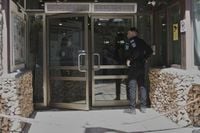Jerusalem has been rocked once again by violence, as a Palestinian employee stabbed two guests at a hotel just outside the city on Friday, September 12, 2025. The incident, which unfolded in the serene surroundings of Kibbutz Tzuba, marked the second suspected militant attack to hit the area within a week, underscoring the region’s ongoing volatility amid the wider Israel-Hamas conflict.
According to Israeli police, the attacker emerged from the kitchen and targeted two guests in the hotel’s dining room. Quick-thinking bystanders sprang into action: an off-duty police officer, present with his family, and the hotel’s dining manager both tackled the assailant, restraining him until additional officers arrived and made the arrest. The dramatic intervention almost certainly prevented further bloodshed. As reported by the Associated Press, police later confirmed that the attacker hailed from the Shuafat neighborhood in East Jerusalem.
Israeli paramedics responded rapidly, evacuating two men—one approximately 50 years old, the other 25—to a nearby hospital. Both had sustained stab wounds to their torsos. Medical officials stated that the older man was left in critical condition, while the younger victim’s injuries were serious but not immediately life-threatening. The prompt medical care likely played a crucial role in preventing a tragic escalation.
In the aftermath, police announced the arrest of three additional suspects believed to be connected to the attack, though details about their alleged involvement have not yet been released. The investigation is ongoing, with authorities determined to piece together the chain of events and motives behind the assault.
Friday’s stabbing comes on the heels of a deadly shooting that occurred just days earlier, on September 8, 2025. In that incident, two Palestinians from the Israeli-occupied West Bank opened fire at a bus stop in Jerusalem, killing six people. The militant group Hamas, which governs the Gaza Strip, claimed responsibility for the earlier shooting. According to AP and other major outlets, Hamas praised Friday’s hotel stabbing but stopped short of claiming direct responsibility for it. This distinction, while subtle, has become increasingly common in the group’s communications as violence surges across the region.
The backdrop to these attacks is the ongoing Israel-Hamas war in Gaza, which was triggered by Hamas’ large-scale assault into Israel on October 7, 2023. That event set off a chain reaction of military operations, reprisals, and civilian suffering that continues to reverberate nearly two years later. According to AP and corroborated by multiple sources, the conflict has killed tens of thousands of Palestinians and catalyzed a dramatic rise in violence both within Israel and in the occupied West Bank. The toll on human life and the social fabric of the region has been staggering, with each new attack deepening wounds and fueling further cycles of retaliation.
Friday’s attack at Kibbutz Tzuba has left many Israelis and Palestinians alike grappling with renewed fears about personal safety, especially in spaces once considered peaceful or insulated from the wider conflict. The kibbutz, known for its bucolic setting and reputation as a tranquil retreat, was abruptly transformed into a crime scene. Hotel guests, staff, and first responders alike have recounted the chaos and confusion that erupted in the wake of the stabbing, with many struggling to process how quickly violence can intrude into daily life.
Police officials have been quick to praise the actions of the off-duty officer and the hotel’s dining manager. Their decisive response, authorities noted, likely saved lives. "The attacker was tackled by an off-duty police officer and the hotel’s dining manager until police arrived and arrested him," Israeli police stated, according to AP. Eyewitnesses described a scene of panic followed by swift cooperation, as other guests also helped restrain the assailant before law enforcement could intervene.
The attacker’s identity has been partially disclosed: he is from the Shuafat area of East Jerusalem, a neighborhood that has often been at the center of tensions between Palestinian residents and Israeli authorities. The arrest of three additional suspects on suspicion of involvement in the attack has added another layer of complexity to the investigation. While police have not released further details, the move signals concern about broader networks or possible accomplices in the planning or execution of the assault.
For many observers, the timing and nature of the attack are deeply troubling. The fact that it occurred just days after the deadly bus stop shooting has raised alarm about a possible pattern of escalating violence. Both incidents have been described by Israeli authorities as militant attacks, and both have drawn condemnation from a range of political and civil society leaders. Hamas’ public praise for Friday’s stabbing, even without claiming direct responsibility, has only heightened anxieties on both sides of the conflict.
The broader context is impossible to ignore. Since the eruption of the Israel-Hamas war in October 2023, the region has seen an unprecedented surge in violence. According to AP and other outlets, tens of thousands of Palestinians have lost their lives in Gaza, while Israeli casualties and security concerns have also mounted. The war has not only devastated communities in Gaza but has also contributed to a marked rise in attacks within Israel and the West Bank, creating an atmosphere of fear and mistrust that shows little sign of abating.
International reactions to the latest wave of violence have been mixed. While some governments have condemned the attacks unequivocally, others have called for restraint and renewed dialogue. Human rights organizations have expressed concern about the cycle of violence and the impact on civilians, urging all parties to prioritize the protection of noncombatants and to seek avenues for de-escalation. Yet, on the ground, the sense of insecurity remains palpable, with many residents bracing for further unrest.
As investigations continue into Friday’s stabbing and the earlier bus stop shooting, questions linger about what can be done to stem the tide of violence. Security measures are likely to be tightened at hotels, public spaces, and transportation hubs, but many experts caution that such steps, while necessary, address only the symptoms of a much deeper conflict. The underlying issues—territorial disputes, political grievances, and the legacy of decades-long hostilities—remain unresolved, fueling a sense of despair and fatalism among many in the region.
The events of the past week have served as a grim reminder of how quickly violence can erupt, even in places that seem far removed from the front lines. For the residents of Jerusalem, Kibbutz Tzuba, and beyond, the challenge now is to find ways to heal, rebuild trust, and prevent further tragedies from unfolding.



